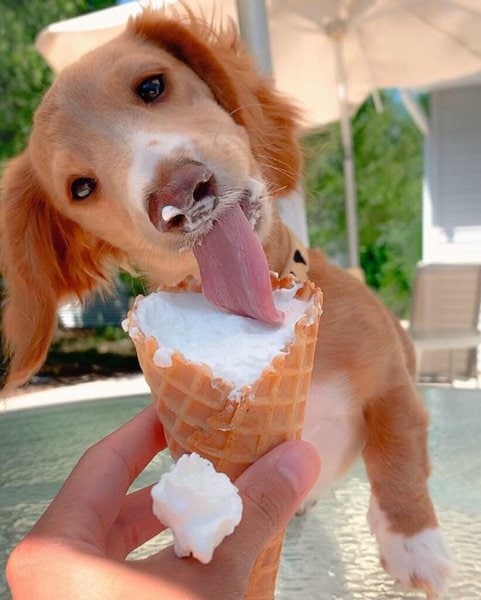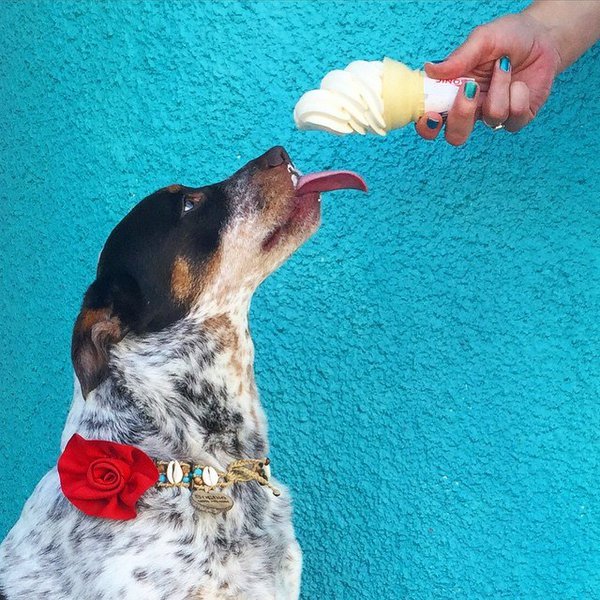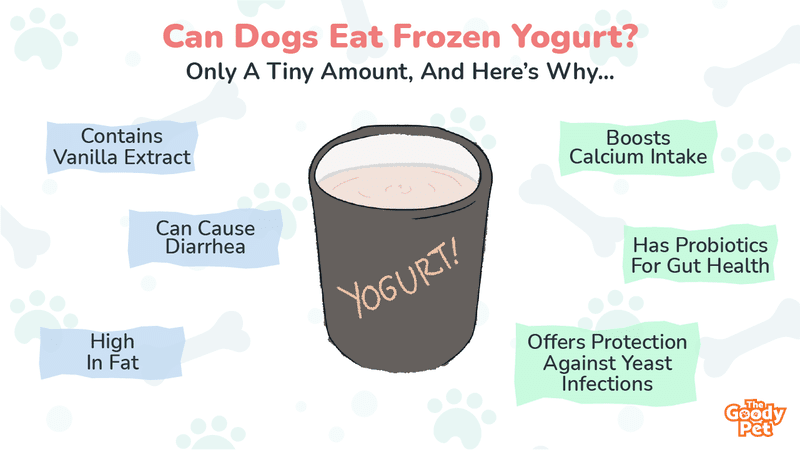Our furry friends will follow us everywhere we go and even want to try out what we eat. Many dog owners often give their pups a little bite or lick of their favorite dish or snack, sometimes including ice cream and frozen yogurt. Yogurt commonly contains probiotics, live cultures, and protein. This is perfect for humans because it helps with digestion.
According to veterinarians, it is not recommended to feed frozen yogurt or other milk products like ice cream to dogs. Dogs can have a small sample or a taste without causing significant harm to their stomachs. Their digestive systems are not built to handle dairy products, for the most part. There are some health risks involved when your pup snacks on this frozen treat.
This guide provides answers regarding the kinds of human snacks we can feed our pups, the health risks of eating frozen yogurt or ice cream, how serious the risks are, and most importantly, what you should do if your dog eats frozen yogurt. We will also review some better alternatives you can feed your pet. Before reviewing the health risks of frozen yogurt and other dairy products for your doggies, let’s start with whether dogs can eat any yogurt.
Can Dogs Eat Frozen Yogurt?

There is nothing as heartbreaking as being unable to share your snack with your pups. Sometimes, it is necessary for their health and well-being.
However, there are a few things that pup owners should keep in mind before sharing a scoop of this delicious frozen treat. Many of these products contain sweeteners and other additives to give them that taste many people love.
You can give your pup a tiny amount of frozen yogurt, but be careful of the ingredients, especially sweeteners. Dogs do not need sugar in their daily diet, so it is best to give them a scoop of something sugar-free or made of natural ingredients. Even on a hot day, there are some better alternatives to feed your pup, which we will look at later.
One thing that should stop you from giving doggies frozen yogurt is lactose intolerance. For the most part, dogs are not built to digest dairy, so you should keep an eye out for that. The best way to know if they handle dairy is by giving them a very small amount and seeing how they react.
How Much Frozen Yogurt Should Dogs Eat?
Before giving your pups some yogurt, it is important to find out if they are lactose intolerant. If they are not, you can give a teaspoonful to smaller dogs and 2 or 3 teaspoons to larger dogs. It should be treated as a snack and not a full meal. So be careful.
The probiotics found in yogurt can help with a doggie’s gut health. However, yogurt is not the only source they should ingest. Talk to your vet for advice on which probiotic supplement you can add to your pup’s meals for the best results.
Can My Dog Eat Dairy-Free Frozen Yogurt?
When you want to give your pup a frozen treat, a small spoonful of dairy-free frozen yogurt is alright. This is because it will not affect a lactose-intolerant pup as much as the regular kind would.
Experts advise that you, however, avoid giving them the store-bought kind. Instead, freeze some regular plain yogurt and serve a small amount to your pup once frozen or chilled. In addition, avoid giving your pup frozen yogurt containing artificial flavors and sweeteners.
What Are The Health Benefits of Frozen Yogurt For Dogs?

Offers Probiotics For Gut Health
About 70% of a dog’s immunity is attributed to the gut. Dogs can eat natural foods but may react negatively to processed food items. Frozen yogurt, just like regular yogurt, contains probiotics that help both humans and dogs with gut health. Probiotics help to maintain weight, reduce chances of illness, improve coat health, and boost digestive system functioning.
Boosts Calcium Intake
Your pup needs strong teeth and bones to help them eat and play. Some frozen yogurt brands are rich in calcium, and this helps with the functioning of the nervous system.
Protection Against Yeast Infections
Probiotics in frozen yogurt help dogs overcome yeast infections. It also helps with itchy skin and even ear infections. Some brands help reduce the chances of infections.
Rich In Protein
Protein intake is an important component of your dog’s health as it helps with growth. This is thanks to amino acids that help to repair skin, muscles, and hair. If your dog has a weight problem, protein helps to boost metabolism.
Improves Dental Health
Quality frozen yogurt contains whey, which helps to protect the doggie’s teeth from tartar and plaque. It also helps to regulate mouth bacteria that are mostly responsible for tooth decay.
What Does Frozen Yogurt Contain That Is Bad For Dogs?

Artificial Sweeteners
Avoid giving your pups any yogurt, especially frozen yogurt, containing sweeteners or added sugar. One of the most toxic sweeteners for dogs is xylitol. According to the FDA, xylitol is classified as sugar alcohol.
Xylitol does not affect humans as much as it affects dogs. When your pup takes this sweetener, it is immediately absorbed into the bloodstream and can have a negative effect on the pancreas.
Experts advise that you should take your dog to an emergency clinic or animal poison control center as soon as possible if they eat anything containing xylitol.
Some Fruits
It might sound strange, but there are fruits that are not good for dogs. Some of these include grapes, cherries, and wild berries. These fruits can cause bowel discomfort to your pups. Instead, opt for plain frozen yogurt or regular Greek yogurt.
Fat Content
There are full-cream frozen yogurts that are high in fat content. Avoid giving these to your dogs because they will have difficulties digesting them. Instead, opt for low-fat or fat-free options.
Vanilla Extract
When choosing a yogurt for your doggies to eat, avoid any product that contains vanilla extract.
Vanilla is known to be toxic to dogs due to its high alcohol content.
If alcohol enters your dog’s bloodstream, it can affect dogs within 30 minutes. The alcohol can cause lethargy, bowel discomfort, and nausea.
What Are The Health Risks Of Dogs Eating Frozen Yogurt?
If taken in a small amount, frozen yogurt is alright for pups. However, consuming too much frozen yogurt will cause negative side effects. If you notice your dog experiencing any of these for a prolonged time, take your dog to the vet for a checkup:
- Lactose intolerance (which can cause skin redness, itching, and discomfort)
- Diarrhea
- Nausea and vomiting
- Gut discomfort
- Gas
Is There Xylitol In Frozen Yogurt?
Yes, xylitol is commonly found in frozen yogurt or any other type of yogurt. This sweetener is not known to affect humans, but it can potentially harm dogs.
The main reason why it is considered dangerous to pups is that it can harm the pancreas in a short time after ingestion. As advised, please take your pup to the emergency room or a poison specialist for treatment.
What Alternative Treats Can Dogs Have?

Add Fruit To Natural Frozen Yogurt Or Regular Greek Yogurt
Chop or blend your pup’s favorite fruits and add a spoonful of frozen yogurt. This is a great alternative to giving them only plain frozen yogurt in case you want to add some flavor to their treats.
Fruit Yogurt Popsicles
For a hot day, you can turn the above snack into popsicles. Use a mold to make the popsicles and freeze them for a few hours. Give your pup a small amount to cool off on a hot day.
Fruits
Cut fruits like apples, strawberries, bananas, and blueberries into bite sizes to avoid choking. Fruit helps protect dogs’ teeth and boosts their gut health.
Can My Dog Eat Vanilla Ice Cream?
As mentioned, a very little taste of vanilla ice cream for your little furry friend is not harmful—as long as it does not contain chocolate or harmful additives. This is because chocolate in itself is harmful to your pup’s health.
That said, vanilla extract is a harmful ingredient to pups because it can cause health complications, and this is why a tiny amount is acceptable. If you want your dog to enjoy some ice cream, choose one with mild flavor or made with natural ingredients.
In some cases, find out from your local pet store or online if you can score some doggy gelato or ice cream. In that way, you are sure they are taking something safe for them.





